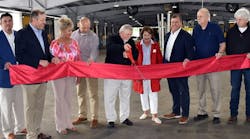GRAPEVINE, TX. Trucking companies starting out must find a way to stand out from entrenched, larger competitors, several leaders of the truckload industry advised attendees at the Truckload Carriers Assn. annual meeting in Dallas.
Asked by moderator Todd Amen, president of trucking consulting firm ATBS, what they have learned that they would pass on to today’s new carriers, Swift Transportation founder and CEO Jerry Moyes quipped, “If I had to start again I probably wouldn’t.”
Moyes, who built Swift from one truck to the nation’s largest truckload carrier, said new carriers need to manage cash flow very carefully and “find a business that needs specialized services.” New trucking companies can’t hope to compete with established carriers otherwise, he said.
Clif Parker, president and general manager of G&P Trucking, agreed. “We have gone behind the big guys and done what they didn’t want to do,” said Parker, whose company operates about 700 trucks. Parker said new carriers need to write a business plan, to build enough cash to float receivables and to “reward key people with equity in the business.”
Josh England, president and chief financial officer of C.R. England, also advised new carriers to look for a point of differentiation. They also need an intense focus on asset utilization, said England.
As a counterpoint to the discussion of what lessons the truckload leaders had from starting out, Amen asked for lessons from a more recent period: The Great Recession.
C.R. England learned the importance of cost control, England said. “People can always justify adding head count in a way that sounds good, but we are committed to remaining lean,” he said. The carrier also learned to stick to its core, England said, adding, however, that “the core” changes gradually over time. “What we consider core now wasn’t core when we started.”
Swift learned the need for cost control not just from the recession but also the carrier’s privatization move, which created a great deal of leverage. “The first think I did every morning was write a $1 million check for interest,” Moyes said. “The good news is that was only five days a week.” Going private added more than $2 billion in debt, including about $500 million at 12.5% interest. Swift has since become a public company once again.
While Moyes believes that leverage brought benefits such as focus, Parker’s view from the recession is quite the contrary.
“Debt is not good,” Parker said. Carriers make better decisions if they aren’t saddled with a crushing debt load, he said.
Other topics of discussion included getting shippers on board with efficiency, driver recruiting and retention, financing highway infrastructure and the future of independent contractors, among other topics.



